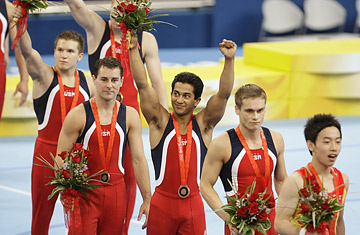
U.S. gymnasts Jonathan Horton, Joey Hagerty, Raj Bhavsar, Alexander Artemev celebrate their surprise bronze medal win.
It's one thing to be perceived as the underdog in sports, but quite another to enter as the stray. And that's how most of the world saw the squad of six Olympic neophytes on the U.S. men's gymnastics team, two of whom are eleventh-hour alternates; with one, Alexander Artemev, getting the call to suit up just a day before the competition began. Entering the team finals, the U.S. trailed China, the leader, and eventual gold medal winner, by 9.475 points and occupied a medal-distant sixth place. Yet the unexpected does tend to occur at the Olympics, and the American men ultimately found themselves accepting bronze medals in the men's team finals Tuesday, behind the heavily favored China and Japan.
While the Chinese and Japanese fans in the National Indoor Stadium seemed to concern themselves with who could shout loudest in the upper bleachers, the U.S. men focused on finding their voices by overcoming their inexperience and relying instead on the brotherhood they had begun to nurture. Led by team captain Kevin Tan, a soft-spoken Chinese American from Fremont, California, the team tried to mesh its disparate personalities into a consistent, well-performing whole.
Famously without the Hamm twins, Paul and Morgan, both of whom pulled out of the Beijing Games due to nagging injuries that prevented them from performing at their peak (Paul is the defending Olympic all-around champion, and Morgan is a 2004 veteran), working as a cohesive unit was the only way the U.S. was ever going to reach the medal stand. And Tan knew just the way to do that — by keeping his teammates confident and deaf to the doubters. Texan Jonathan Horton, the team's best all-around gymnast who came a few tenths short of an all-around individual medal at last year's world championships in Stuttgart, acknowledges that he "gets hyped up, and psyched in the moment. I'm off the wall constantly talking gymnastics and saying 'Hey, watch those routines [of the other gymnasts]'", he says. "And Kevin would say 'Would you pay attention to yourself and everything that we are doing.' He always sets us straight and puts us in line." Justin Spring, a Virginia native whose vibrant and excitable personality matches Horton's, agrees, and appreciates that "Kevin is my pacifier. I tend to be over the top most of the time, always talking. Kevin balances me out, with quiet confidence."
For a team cobbled together a mere 24 hours before they had to hit the mats, the U.S. men flowed freely as a unit during Aug. 12's team final, with Joseph Hagerty stepping in to lend his expertise on parallel bars, and Artemev adding the flair of his pommel horse routine into the mix. They also got lucky with the rotation order, pulling one of their strongest events — the still rings — first out of the six. Tan, a national champion on the rings, helped the men to reach third place after that rotation. But it wasn't until they reached the high bars that the U.S. squad found its medal rhythm. Flowing routines by Jonathan Horton and Justin Spring, both of whom landed squarely to punctuate their determination, pushed the team to second behind the Chinese. "For a bunch of first timers, they did amazingly well" says Miles Avery, the Hamms' coach. "People felt without Paul and Morgan we had nothing. But we had a lot left."
Even Avery can't explain why this team has bonded so quickly and strongly, but perhaps overcoming injuries, and losing teammates, combined to bring the under-appreciated Americans to the medal stand. "I was nervous not so much on my own behalf but for everyone else," says Horton. "We all want [so badly] to see each other do well." Artemev and Horton are the U.S.'s entrants into the all-around competition, which takes place August 14, a far less collegial contest that pits one gymnast against another on all six apparatus. But even then, it's likely that the two won't be competing alone — at least in spirit. "Team is everything," says head coach Kevin Mazeika. "Our mantra is 100% one team, one dream." China's Yang Wei is the current world champion, and expected to avenge his 2004 nightmare, in which he literally fell from medal contention when he lost his grip on the high bars. The drop pushed him out to seventh while gold went to Paul Hamm.
On Wednesday it's the ladies' turn, but the females aren't the underdogs that the men were thought to be. Trailing the Chinese after the qualifying round by 1.475 points, the slate is wiped clean and, just as with the men, three girls compete on each apparatus and all three scores will count. With the reigning world champion Shawn Johnson and several world medalists on deck, the U.S. women are expected to give China a good tumble for the gold. While the men proved everyone wrong; the women must live up to their expectations.
